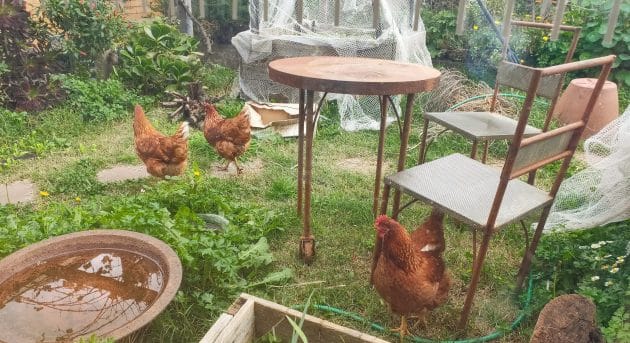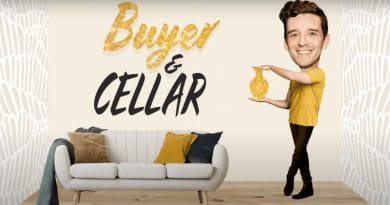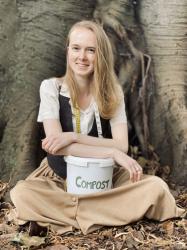The Composting Costumier talks Bringing Nature Home with Lucy Best
So…you panic-bought plants and started a garden in lockdown, now what? To celebrate International Composting Awareness Week (Yes, that is a thing and yes we did only just find out about it researching for this interview) this month, the Composting Costumier talks to Performer and green thumb Lucy Best about bringing nature home and what you can do to help care for your little bit of earth.
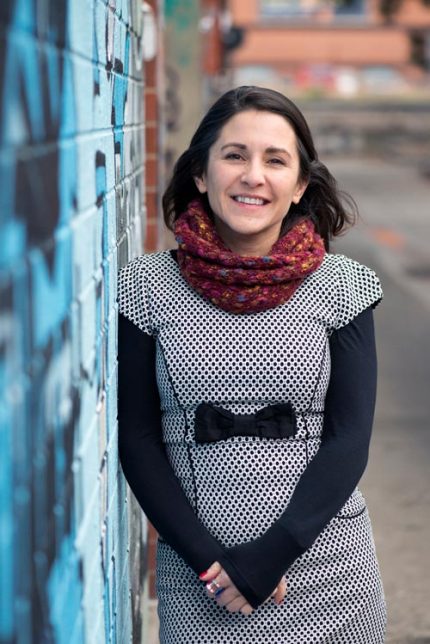
Firstly, what do you do in terms of your involvement with the arts?
I’m primarily a performer and writer, I do acting, stand-up comedy and a bit of cabaret.
What is your connection and involvement with issues around Sustainability?
I work for the Australian Energy foundation and we do lots of research and education around energy efficiency and renewable energy. We help pilot things like microgrids and emerging technology. I work in engagement, so with my background in the arts and performance, I do lots of presenting on very scientific things. I once had someone come up to me after I was doing a talk and they were like, “Oh that was really great! Are you an engineer?” And I was like, “No I’m an actress, I’m just pretending”. But obviously I’ve been there for nine years so I have learnt a lot, but I definitely don’t have an engineering background.
How did you get involved with them?
I was actually volunteering with Environment Victoria. I’d had two kids and so I’d been getting work as a freelance photographer and started thinking maybe that wasn’t the ideal day job. I was doing weddings and they were weekends, so that was when I wanted to either have family time or if I was involved with arts things, they’re often on weekends and evenings. So I was thinking about what else wanted to do. I’ve always been passionate about the environment so I was volunteering with Environment Victoria and then, it’s actually kind of a weird story, someone came to do a home energy audit at my house. We got chatting and I mentioned I’d done a door-knocking project with Environment Victoria and he said “I don’t suppose you’re looking for a job, are you? We’re going to start a door-knocking campaign” and I thought, “actually this feels like good timing”.
So I started working for them as a Community Outreach Worker and I would go door-knocking and offering people sustainability advice. We had these show bags of things from Sustainability Victoria like compact fluorescent light-globes and draught stoppers for the bottom of the door and then from Yarra Valley Water we got shower timers. So I was just doing door-knocking, talking to people about how they were managing their bills and giving them sustainability advice and then after a couple of years, I ended up getting a job as an Engagement Officer for a program they were running linking households to solar and energy efficiency products and services. Now I’m the Manager of Engagement for what is now a national organisation.
So as I was saying before, people think that I have an engineering background or something, but I’m just an arts person who likes the environment.
That’s so funny, I had no idea about any of this. I just knew you had a great garden, what a coincidence. My next question was actually what’s your favourite way to bring nature home? I know you’re into veggie gardening and stuff?
Yeah so I used to live in Brunswick East so just had a bit of a courtyard but we lived near Ceres Environment Park, near the creek. I had a baby who became a toddler and then I moved up to Coburg North before my second kid was born. I used to go for lots of walks and that really helps with mental health. Then I got this house with a garden and got really into growing food and now I’ve got chickens. As a kid I used to spend weekends on my uncle’s organic farm in Dorset, England so I sort of got my hands dirty and wasn’t afraid of that, but I hadn’t really had a garden before, I’d only really grown things in pots. I grew up in London so I didn’t have the garden growing up but I did have the farm on weekends.
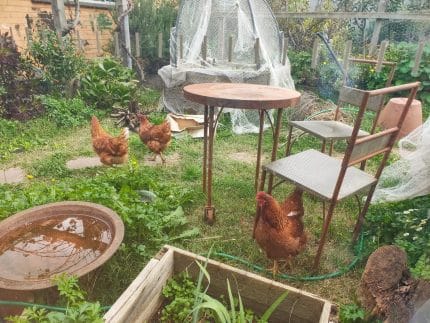
So that just started as an opportunity with the new space?
Yeah, so when we moved in it was just a couch lawn and a hills-hoist. It’s now a very plentiful garden with fruit trees and veggies and things.
That’s very cool! Part of the reason for this article is that lots of people have started gardening and getting plants and stuff in isolation. Do you have any tips for people who have just gotten more into this sort of thing?
Yeah, a few tips, one is I would recommend if you’re starting out, buy seedlings not seeds because you’re just probably going to have more success. Also, make sure you have good soil. So if you’re planting in the garden dig through some compost and some good nutrients into the soil. If you’re growing in pots if you’re trying to grow food make sure you don’t just use regular potting mix, use soil that’s designed for growing food.
The other thing I do is moon planting. The principle is that when the moon’s at different stages the gravitational pull is different so the sap is higher or lower. So there are certain times of the month when it’s better to plant root vegetables because the gravity is drawing them into the earth and there are other times when it’s better to plant crops that grow upwards and then there are certain times it’s better to weed and stuff like that. Ancient Science.
What challenges do you think people might come across?
I think not knowing your soil and things not surviving is really challenging because it’s really disheartening. The other thing that happens is things bolt to seed and the moon-guide planting helps with that because if you plant things at the wrong time they cycle much quicker and they’ll bolt to seed much quicker But I think if you find that you’re planting things and they’re dying, try planting something else. Like I worked out my garden just won’t grow citrus, despite the fact there are people around on my street with big plentiful mandarine and lemon trees, for some reason citrus doesn’t like my soil and instead of battling against it, I just plant other things.
I definitely need to get better at that, my soil is not good enough yet. You’ve already sort of touched on this, but what do you see as the benefits of staying engaged with this sort of thing even when life gets back to ‘normal’ however that looks.
For me, I think one of the primary benefits is mental health. I think it’s really good for you to just get out in nature and get your hands dirty and it’s sort of an exercise in mindfulness and patience.
Growing and planting things is such an act of hope, isn’t it? Because you’re investing in the future.
But of course, there are all sorts of benefits like getting food straight from the garden and I think if people go back to work and it’s too much work to manage a garden, just growing herbs, things like rosemary is very hardy and it’s very rewarding just going and picking something as you’re cooking and adding it in. There are some quite hardy chilli-bushes you can get, there are lots of herbs that are perennial. So you can just plant things now that even when you don’t have time to tend to them, they can still be providing food for you and providing just that sense of satisfaction that it didn’t have any carbon emissions associated with getting it to your house, you didn’t have any chemicals added, or not that you don’t know about, and you know it’s fresh.
Do you have any other sustainability tips either at home or when you’re working in theatre or anything that you’d like to pass on?
I mean waste is something that I really worry about. As you know when we were doing Romeo and Juliet I was taking everything home, all the recycling home every night. Food waste is a big problem and another good thing about growing your own food is that you’re not having all that packaging and you’re not having all that waste. I’ve got chickens so that’s really good. No food goes to waste in my house because between the dog, the chickens and the compost bin we can dispose of everything that’s organic on-site. Even just stuff like bits of material (cotton and natural fibres) that you can put in the compost and they break down. Yeah, I think if people are more aware of not throwing things out – when you throw things away, where is away? That’s something I try to live by wherever I am, whether in a theatre context or in my day job or at home.
I didn’t even realise you were doing all that on Romeo and Juliet!
It was so funny! I’d just bring a milk crate or two home every day with all sorts of things, like even the soft plastic and the little water bottles people were using and the chucks wipes, sometimes I brought them home and washed them because I kept getting really frustrated that everyone was just throwing them away!
I think everyone was on board with it once they thought about it.
It’s just one of those things, it’s changing your mindset if you’re used to just chucking things in the bin.
If you have to think ‘we put this thing in this bin and this thing in this other bin’, then it takes time initially but once it becomes a habit you don’t have to think about it anymore and because I’ve been doing these things for so long I don’t have to think about them.
Do you have any sources of inspiration for people out there interested in this?
I love Jackie French books, they’re really good. There’s one called Soil Food and I think that’s where I learnt a lot about how to work with the nutrients and help the nutrients in your soil and stuff. She’s written a lot of books and she’s written books about chickens and companion planting and she’s very real. I think being in the arts I always find engaging with people through a story is helpful Like the human story and her books aren’t just facts like, ‘do X, Y and Z to get these outcomes’. It’s more like, ‘Here’s the story about how I learnt this about my garden and here’s the things that went wrong and this is why’. That’s how I relate to people, the human side of things and stories, so I really recommend her books for that element.
I was also a member of Diggers Club, for the first probably two or three years that I was establishing my garden and they had a magazine and seed offers and you could get a bit of advice from them. If you’re starting out Bulleen Art and Garden is a great resource as well in Heidelberg and they do little courses. I did I think a four-night course on companion planting. Connecting with things in your area:- probably just going to Bunnings or somewhere like that means there may not be any experts, so going to a proper garden centre where people are the ones growing all the plants, (rather than just arriving in a shipping container) means that you can get advice.
My last question is usually what’s your compost situation but we’ve discussed that already, do you have anything else you want to pass on?
I guess that it’s not that hard, there’s so much resistance because people feel like to live a more sustainable life they’re supposed to give things up, but you don’t have to, you just do things a bit differently.
We’ve got a rainwater tank for our laundry and toilet, we’ve got solar panels, we’re trying to gradually switch off the gas to have an all-electric home, so we can power it as much as possible with the solar, we grow food, we compost. We’re lucky (when I say we it’s me and my two adolescent kids) we can do those things, but obviously, as a renter, you can still compost, you can still change your light globes, you can still recycle. There’s lots you can do.
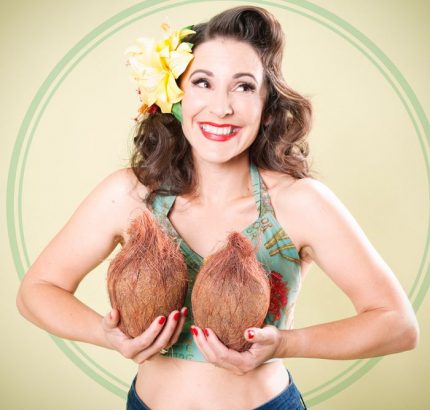
Do you have anything (virtually I guess with restrictions still on) coming up where people could see your work?
I wasn’t doing too much online content because I suppose there’s a bit of me that doesn’t want to invest too much time in this because one day I can get back out there, but I’m actually doing a live Mother’s Day show on Zoom on Sunday (10th May) and I’m doing a comedy event in a week on Thursday (14th May) so that will be good, I’m missing performing.
Other than that, I have a mailing list and I have a twitter, I was supposed to be doing a show in June at the Butterfly Club so if restrictions opened up enough that could happen but probably not.
You can find out more at Lucybest.com

